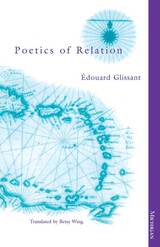2 books about Glissant, Edouard

Faulkner, Mississippi
Edouard Glissant
University of Chicago Press, 2000
In 1989, the Caribbean writer Edouard Glissant visited Rowan Oak, William Faulkner's home in Oxford, Mississippi. His visit spurred him to write a revelatory book about the work of one of our greatest but still least-understood American writers.
"A fascinating way to read Faulkner. . . .[Glissant's] case is nothing less than that, no matter how Faulkner's personal Furies twisted his public speech, Faulkner was a great, world-beating multiculturalist."—Jonathan Levi, Los Angeles Times Book Review
"A sharp, challenging, and wholly unique tour of Yoknapatawpha County." —Kirkus Reviews
"Passionate. . . . Glissant's prose sometimes vies with Faulkner's for intricacy and evocative nuance." —Scott McLemee, Newsday
"Glissant tries to engage Faulkner on many fronts simultaneously, positioning himself as a critic, a fellow artist and as a descendant of slaves. . . He makes a convincing case that Faulkner is not just another 'dead white male author.'"—Scott Yarbrough, Raleigh News & Observer
"[An] ambitious and, at times, rambunctious expedition into Yoknapatawpha County." —Christine Schwartz Hartley, New York Times Book Review
"A fascinating way to read Faulkner. . . .[Glissant's] case is nothing less than that, no matter how Faulkner's personal Furies twisted his public speech, Faulkner was a great, world-beating multiculturalist."—Jonathan Levi, Los Angeles Times Book Review
"A sharp, challenging, and wholly unique tour of Yoknapatawpha County." —Kirkus Reviews
"Passionate. . . . Glissant's prose sometimes vies with Faulkner's for intricacy and evocative nuance." —Scott McLemee, Newsday
"Glissant tries to engage Faulkner on many fronts simultaneously, positioning himself as a critic, a fellow artist and as a descendant of slaves. . . He makes a convincing case that Faulkner is not just another 'dead white male author.'"—Scott Yarbrough, Raleigh News & Observer
"[An] ambitious and, at times, rambunctious expedition into Yoknapatawpha County." —Christine Schwartz Hartley, New York Times Book Review
[more]

Poetics of Relation
Édouard Glissant
University of Michigan Press, 1997
Édouard Glissant, long recognized in the French and francophone world as one of the greatest writers and thinkers of our times, is increasingly attracting attention from English-speaking readers. Born in Martinique in 1928, Glissant earned a doctorate from the Sorbonne. When he returned to his native land in the mid-sixties, his writing began to focus on the idea of a "relational poetics," which laid the groundwork for the "créolité" movement, fueled by the understanding that Caribbean culture and identity are the positive products of a complex and multiple set of local historical circumstances. Some of the metaphors of local identity Glissant favored--the hinterland (or lack of it), the maroon (or runaway slave), the creole language--proved lasting and influential.
In Poetics of Relation, Glissant turns the concrete particulars of Caribbean reality into a complex, energetic vision of a world in transformation. He sees the Antilles as enduring suffering imposed by history, yet as a place whose unique interactions will one day produce an emerging global consensus. Arguing that the writer alone can tap the unconscious of a people and apprehend its multiform culture to provide forms of memory capable of transcending "nonhistory," Glissant defines his "poetics of relation"--both aesthetic and political--as a transformative mode of history, capable of enunciating and making concrete a French-Caribbean reality with a self-defined past and future. Glissant's notions of identity as constructed in relation and not in isolation are germane not only to discussions of Caribbean creolization but also to our understanding of U.S. multiculturalism. In Glissant's view, we come to see that relation in all its senses--telling, listening, connecting, and the parallel consciousness of self and surroundings--is the key to transforming mentalities and reshaping societies.
This translation of Glissant's work preserves the resonating quality of his prose and makes the richness and ambiguities of his voice accessible to readers in English.
"The most important theoretician from the Caribbean writing today. . . . He is central not only to the burgeoning field of Caribbean studies, but also to the newly flourishing literary scene in the French West Indies." --Judith Graves Miller, University of Wisconsin, Madison
Édouard Glissant is Distinguished Professor of French at City University of New York, Graduate Center. Betsy Wing's recent translations include Lucie Aubrac's Outwitting the Gestapo (with Konrad Bieber), Didier Eribon's Michel Foucault and Hélêne Cixous's The Book of Promethea.
In Poetics of Relation, Glissant turns the concrete particulars of Caribbean reality into a complex, energetic vision of a world in transformation. He sees the Antilles as enduring suffering imposed by history, yet as a place whose unique interactions will one day produce an emerging global consensus. Arguing that the writer alone can tap the unconscious of a people and apprehend its multiform culture to provide forms of memory capable of transcending "nonhistory," Glissant defines his "poetics of relation"--both aesthetic and political--as a transformative mode of history, capable of enunciating and making concrete a French-Caribbean reality with a self-defined past and future. Glissant's notions of identity as constructed in relation and not in isolation are germane not only to discussions of Caribbean creolization but also to our understanding of U.S. multiculturalism. In Glissant's view, we come to see that relation in all its senses--telling, listening, connecting, and the parallel consciousness of self and surroundings--is the key to transforming mentalities and reshaping societies.
This translation of Glissant's work preserves the resonating quality of his prose and makes the richness and ambiguities of his voice accessible to readers in English.
"The most important theoretician from the Caribbean writing today. . . . He is central not only to the burgeoning field of Caribbean studies, but also to the newly flourishing literary scene in the French West Indies." --Judith Graves Miller, University of Wisconsin, Madison
Édouard Glissant is Distinguished Professor of French at City University of New York, Graduate Center. Betsy Wing's recent translations include Lucie Aubrac's Outwitting the Gestapo (with Konrad Bieber), Didier Eribon's Michel Foucault and Hélêne Cixous's The Book of Promethea.
[more]
READERS
Browse our collection.
PUBLISHERS
See BiblioVault's publisher services.
STUDENT SERVICES
Files for college accessibility offices.
UChicago Accessibility Resources
home | accessibility | search | about | contact us
BiblioVault ® 2001 - 2024
The University of Chicago Press









